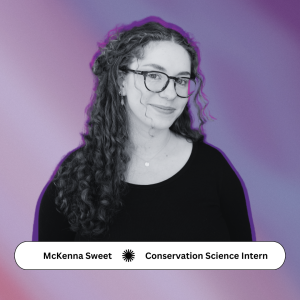 By McKenna Sweet
By McKenna Sweet
Conservation Science Intern, Summer 2024
I want to go into wildlife conservation.
This is something I’ve known since my sophomore year of high school after watching an episode of Planet Earth II that highlighted the endangered Indri lemurs, who are endemic to Madagascar. This is also something I tell people when they ask what my majors are and what I want to do after I graduate.
However, despite laying out my loyalties to protecting non-human species and explicitly saying that I don’t immediately want to go into journalism, I’ve noticed that people still give me unsolicited job suggestions in the communication field instead of seeing how a communication background will support me as a conservation biologist.
This happened at a happy hour for a conference where I was chatting with some folks from the National Oceanic and Atmospheric Administration who suggested a few communication openings they had after I said I wanted to pursue conservation. Another time, an academic advisor suggested I finish my journalism degree and maybe get into the Ecology, Evolution, and Conservation Biology major but not get my degree in it, even though I had made it clear that journalism was the on-the-side major for me, not biology.
I still don’t fully understand why this has been a reoccurring response. I don’t believe it’s malicious in any way, and I appreciate that people try to help by giving me options, maybe remembering the apprehension surrounding their post-undergrad job hunt. But I can’t help but feel that it has something to do that they just don’t see me – a woman – in a career that involves hands-on, muddy, dirty, manly work.
Today, the life sciences are mostly split evenly between men and women. However, a 2023 paper highlighted that women often experience challenges and barriers to fieldwork, such as harassment from colleagues, being discouraged from joining a survey, or being told they’re not strong enough for the work.
That’s why working with an all-woman team of conservation scientists and interns at The Nature Conservancy (TNC) through EarthLab this summer meant so much to me and reminded me that, despite what people apparently think, there are jobs I actually want to pursue in which I can succeed.
Part of my internship was doing fieldwork at Port Susan Bay and along the Stillaguamish River. The data collection was stinky, sweaty, and definitely not pretty, but the bulrushes and sticklebacks didn’t care if the waders I wore were flattering, and neither did the company. All that mattered to me was that the work felt fulfilling and I felt comfortable with the team.
While working, my supervisors shared difficulties they’ve faced with some men in the field, including some condescending engineers who seemed to only respect someone if they had a PhD. One of our guest speakers during the weekly EarthLab meetings talked about how much the STEM field has changed since she was our age, and it made me think about how many other women have had people suggesting careers they were apparently supposed to care more about.
And I’m so glad these women didn’t listen!
After this internship, I was happy that it confirmed, once again, that I do want to pursue a career where I’m outside getting my hands dirty. I also helped create an Instagram post about beavers for the Washington TNC’s account where I used my science communication skills on my own terms. For conservation projects to succeed, there needs to be successful plain-language communication to ensure the public understands the gravity of the situation.
Having two majors doesn’t mean that I’m confined to one of two separate careers, but rather it provides me with a sea of skills that transcend degrees and combine to prepare me for helping people and species in my future career.
Communication and conservation can exist in my life at the same time, just like a woman can exist and thrive in fieldwork. There is a place for me and my femininity in what mostly is still a male-dominated field; I loved getting muddy, but I also hated being sweaty and curled my eyelashes every morning before trekking into the sulfuric-smelling marsh.
I am OK with the fact that I’m more comfortable in waders and my purple floppy hat than I am in business casual – can you be OK with that, too?
NextGen Narratives is an EarthLab blog series tailored for University of Washington students to express how they’re thinking about taking equitable climate action in a variety of ways. If you’re a student eager to join NextGen Narratives, don’t hesitate to contact Allie Long, EarthLab’s Communications Lead, at alongs@uw.edu.